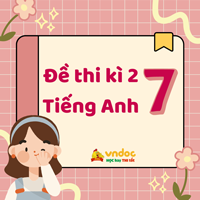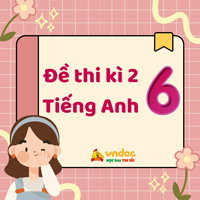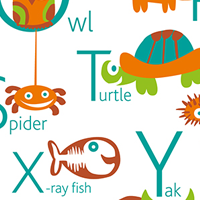Đề thi chọn học sinh giỏi môn Tiếng Anh lớp 10 Sở GD-ĐT Thái Bình năm học 2015 - 2016
Đề thi chọn học sinh giỏi môn Tiếng Anh lớp 10 năm 2016 có đáp án
Trong bài viết này, VnDoc xin giới thiệu Đề thi chọn học sinh giỏi môn Tiếng Anh lớp 10 Sở GD-ĐT Thái Bình năm học 2015 - 2016 có kèm đáp án chi tiết cụ thể giúp các em học sinh ôn thi học sinh giỏi hiệu quả. Sau đây mời các em cùng thử sức nhé!
Đề thi chọn học sinh giỏi môn tiếng Anh lớp 10 tỉnh Hải Dương năm học 2012 - 2013
Mã đề 135
SECTION A: MULTIPLE CHOICE QUESTIONS (16 POINTS)
Mark the letter A, B, C, or D on your answer sheet to indicate the word whose underlined part differs from the other three in pronunciation in each of the following questions.
Question 1: A. adventure B. future C. mature D. figure
Question 2: A. coughed B. weighed C. laughed D. photographed
Question 3: A. musket B. business C. muscle D. muscular
Mark the letter A, B, C or D on your answer sheet to indicate the word that differs from the rest in the position of the main stress in each of the following questions.
Question 4: A. lyrical | B. emotion | C. favorite | D. classical |
Question 5: A. entertain | B. atmosphere | C. serious | D. joyfulness |
Mark the letter A, B, C, or D on your answer sheet to indicate the correct answer to each of the following questions.
Question 6:. It was .............we could not go out .
A. so cold that B. such cold that C. very so cold D. too cold that
Question 7 : I really prefer just about anything ..............watching TV.
A. from B. or C. than D. to
Question 8: We have a party tonight and Daisy is worried about ...........
A. what to wear B. which wearing C.that she wears D. these wearing
Question 9: As a rule, new comers ______ a party at the end of the first month of their stay.
A. was held B. hold C. have held D. will hold
Question 10: The most interesting films _____ for the festival will be shown next week.
A. are chosen B. having chosen C. chosen D. being chosen
Question 11: However _____ about the results, the children still talk merrily.
A. disappointed are they B. disappointing they are
C. disappointment D. disappointed they are
Question 12: A child _____ to talk does not learn by being corrected all the time.
A. learned B. learns C. learning D. to learn
Question13: In most .......... developed countries, up to 50% of ........population enters higher education at some time in their lives.
A. Ø / Ø B. the / Ø C. Ø / the D. the /
Question 14 : Some businesses use famous cartoon _____ to advertise their products.
A. person B. people C. characters D. samples
Question 15: The first thing you should do when you lose your bank card is to call your bank and ask them to close your ____.
A. account B. house C. loan D. debt
Question 16: "Oh no! I can't find my credit card!" " _________."
A. Thank you for letting me know
B. Don't worry. They will be back very soon
C. It is a nice surprise. You should be glad about it
D. Chill out. Try to remember when you last used it
Question 17:.I haven't ................................decided where to go on holiday this year.
A. still B. yet C. already D. then
Question 18: How do you speak this fraction: 3/5?
A. Three over fifth B. Three-fifth C. Three-fifths D. Three-fives
Question 19: The number of cars on the roads ______ increasing, so we need to build more roads.
A. is B. was C. were D. are
Question 20: There is no __________ explanation for what happened.
A. scientifically B. scientist C. science D. scientific
Question 21: I can___ what he's doing; it's so dark down there.
A. see through B. make out C. look into D. show up
Question 22: Could you be more specific about what is___ in this particular job?
A. enclosed B. concentrated C. presented D. involved
Question 23 : He retired early........ill – health.
A. on behalf of B. on account of C. believe D. imagine
Question 24 :The person who writes symphonies or concertos is a .................
A. composer B. conductor C. pianist D. playwright
IV. Read the following passage and mark the letter A, B, C, or D on your answer sheet to indicate the correct answer to each of the questions.
As the twentieth century began, the importance of formal education in the United States increased. The frontier had mostly disappeared and by 1910 most Americans lived in towns and cities. Industrialization and the bureaucratization of economic life combined with a new emphasis upon credentials and expertise to make schooling increasingly important for economic and social mobility. Increasingly, too, schools were viewed as the most important means of integrating immigrants into American society.
The arrival of a great wave of southern and eastern European immigrants at the turn of the century coincided with and contributed to an enormous expansion of formal schooling. By 1920 schooling to age fourteen or beyond was compulsory in most states, and the school year was greatly lengthened. Kindergartens, vacation schools, extracurricular activities, and vocational education and counseling extended the influence of public schools over the lives of students, many of whom in the larger industrial cities were the children of immigrants. Classes for adult immigrants were sponsored by public schools, corporations, unions, churches, settlement houses, and other agencies.
Reformers early in the twentieth century suggested that education programs should suit the needs of specific populations. Immigrant women were once such population. Schools tried to educate young women so they could occupy productive places in the urban industrial economy, and one place many educators considered appropriate for women was the home.
Although looking after the house and family was familiar to immigrant women, American education gave homemaking a new definition. In pre-industrial economies, homemaking had meant the production as well as the consumption of goods, and it commonly included income-producing activities both inside and outside the home, in the highly industrialized early-twentieth-century United States, however, overproduction rather than scarcity was becoming a problem. Thus, the ideal American homemaker was viewed as a consumer rather than a producer. Schools trained women to be consumer homemakers cooking, shopping, decorating, and caring for children "efficiently" in their own homes, or if economic necessity demanded, as employees in the homes of others. Subsequent reforms have made these notions seem quite out-of-date.
Question 25: The paragraph preceding the passage probably discusses _____.
A. the most important means of integrating immigrants into American society in the nineteen century.
B. the urbanization in the United States in the nineteen century.
C. the industrialization and the bureaucratization of economic life the United States in the 19th century
D. the formal schooling in the United States in the nineteen century.
Question 26 : It can be inferred from paragraph 1 that one important factor in the increasing importance of education in the United States was _____.
A. the increased urbanization of the entire country
B. the expanding economic problems of schools
C. the growing number of schools in frontier communities
D. an increase in the number of trained teachers
Question 27 : The word "means" in line 5 is closest in meaning to _____.
A. probability B. qualifications C. advantages D. method
Question 28 : The phrase "coincided with" in line 7 is closest in meaning to _____.
A. ensured the success of B. began to grow rapidly
C. happened at the same time as D. was influenced by
Question 29: According to the passage, one important change in United States education by the 1920's was that _____.
A. most places required children to attend school
B. adults and children studied in the same classes
C. new regulations were imposed on nontraditional education
D. the amount of time spent on formal education was limited
Question 30: "Vacation schools and extracurricular activities" are mentioned in line 9 to illustrate _____.
A. the importance of educational changes
B. alternatives to formal education provided by public schools
C. the increased impact of public schools on students
D. activities that competed to attract new immigrants to their programs.
Question 31: According to the passage, early-twentieth century education reformers believed that _____.
A. different groups needed different kinds of education
B. corporations and other organizations damaged educational progress
C. more women should be involved in education and industry
D. special programs should be set up in frontier communities to modernize them
Question 32: The word "it" in paragraph 4 refers to _____.
A. homemaking B. consumption C. education D. production
Question 33: Women were trained to be consumer homemakers as a result of _____.
A. overproduction in the highly industrialized early-twentieth-century United States
B. economic necessity in the highly industrialized early-twentieth-century United States
C. scarcity in the highly industrialized early-twentieth-century United States
D. income-producing activities in the highly industrialized early-twentieth-century United States
Question 34: The word "others" in paragraph 4 means_______.
A. other women B. other homes C. other children D. other employees
Read the following passage and mark the letter A, B, C, or D on your answer sheet to indicate the correct word for each of the blanks from 35 to 44.
SENSES
All five senses are important to us, but the two most important senses are (35) ________ the sense of sight and the sense of hearing. Blind and deaf people must (36) ________ life difficult because they are unable to do (37) ________ that the rest of us can do naturally. People who (38) ________their sense of taste can not enjoy food as (39) ________as they used to, whilst (40) ________ who have no sense of smell can not realize, for example , when gas is (41) _______ or food has gone (42) _______ . In addition to our physical senses, (43) ________ is a great help in life to have sense of humour, especially when things go wrong, and to have (44) ________ sense, something which can not be learned from books.
Question 35 : A. probably B. likely C. certainly D. possibly
Question 36 :A. think B. consider C. find D. regard
Question 37:A. things B. everything C. nothing D. what
Question 38 :A. miss B. haven't C. lack D. lose
Question 39: A. well B. happily C. much D. fully
Question 40 :A. persons B. men C. those D.these
Question 41 :A. losing B. leaking C. breaking D. flowing
Question 42 :A. on B. away C. off D. out
Question 43 :A. which B. here C. there D. it
Question 44 : A. good B. common C. spirit D. intellect











